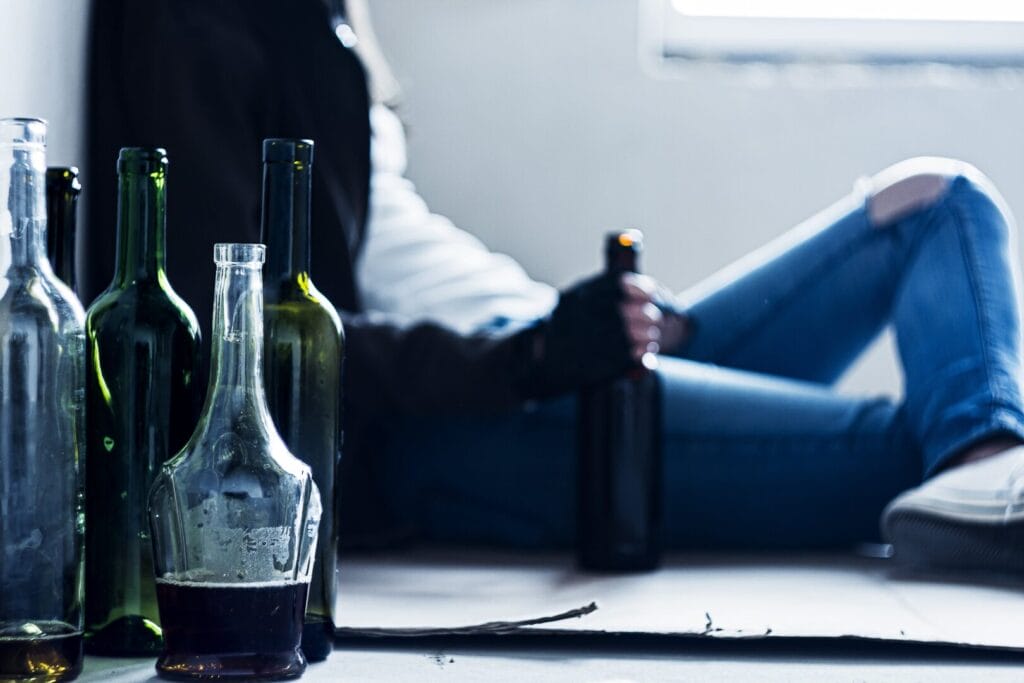What is Binge Drinking
Binge drinking is the consumption of excessive amounts of alcohol in a short period. Binge drinking is the most widespread, costly, and dangerous form of alcohol misuse.
In clinical terms, binge drinking is an episode of alcohol consumption that raises blood alcohol levels in the human body to as high as 80miligrams of alcohol per 100miligrams of blood or more.1
What is Considered Binge Drinking?
Generally, four or more alcoholic drinks in two hours or less can be considered binge drinking. Also, drinking to get drunk quickly can be considered binge drinking if a person has to drink heavily in a short amount of time.
However, it’s hard to determine how many drinks or how long constitutes binge drinking because of individual variability. When trying to pinpoint binge drinking, the number of drinks consumed is considered based on gender, age, height, and weight of the individual.
Is Binge Drinking a Sign of Addiction?
Binge drinking can be a sign of alcohol substance addiction, but this is not always the case. An individual can consume a seemingly excessive quantity of alcohol and have no signs of an addiction. However, when an individual can no longer cut back on excessive alcohol drinking when necessary, then a binge drinking habit can be classified as a sign of an addiction.2
Binge Drinking vs. Alcoholism
The National Cancer Institute defines alcoholism as a chronic disease that causes constant cravings for alcohol and an inability to control alcohol drinking. Alcohol dependency is the hallmark of alcohol use disorders and alcoholism. This involves a physiological or psychological dependence and the precipitation of unpleasant withdrawal symptoms when alcohol use cessation is attempted.
Not all binge drinkers develop alcohol drinking dependency, and some can quit alcohol abuse without resultant withdrawal symptoms. People binge drink for many reasons, including peer pressure, social interactions, and boredom. Most of these people can go through days without alcohol drinking. Also, unlike alcoholism, binge drinking is not considered a mental health condition. However, the risks of binge drinking are severe, likewise those of alcoholism.
Binge Drinking, Causes and Risk Factors
The causes of binge drinking encompass factors that can make an individual decide to binge drink. These factors act as triggers for excessive drinking alcohol or heavy drinking. Binge drinking risk factors increase an individual’s chances of developing a binge drinking problem.
What Causes Binge Drinking?
Here is the cause of binge drinking:
Social Pressure
To feel less awkward in social settings, some individuals may abuse alcohol due to the drinking habits of those around them. Others binge drink because they think alcohol can give them the confidence to interact with others. Young people may feel pressured to binge drink at seasonal events due to peer pressure or because the opportunity presents itself.
Several individuals binge drink to temporarily relieve themselves of feelings such as sadness, anger, guilt, fear, anxiety, or anger.
Risk Factors for Binge Drinking
Risk factors for binge drinking include:
Biological Factors
Having a natural history of alcoholism in family history can increase individual chances of binge drinking.
Mental Health Conditions
Individuals suffering from mental health conditions like depression, anxiety, or bipolar disorders tend to turn to alcohol for comfort and coping methods.
Environmental Factors
In areas or events like parties with easy access to alcohol, individuals around such sites have higher chances of binge drinking.
How Common is Binge Drinking?
Binge drinking is common amongst several demographics. According to the 2019 National Survey on Drug Use and Health (NSDUH), 25.8% of people 18 years or older in the United States admitted to binge drinking in a month. Coincidentally, binge drinking is nearly twice as common in men than in women.3
Preteens and Teens
According to a 2019 study by the NSDUH, approximately 11.1% of preteens and teens binge drink between the ages of 12 and 20. Binge drinking and alcohol usage within this age range is hazardous and can interfere with normal brain development and increase the risks of developing alcohol use disorders.
Young Adults
Research shows that binge drinking and other forms of heavy drinking are prevalent among young adults, especially college students. Another study also showed that college students are more likely to binge drink because of alcohol availability, academic-related stress, and increased peer and social pressure to drink. Young adults engaging in binge drinking are more likely to engage in other risky behaviors and face the most binge drinking health risks.4
Older Adults
A study carried out in 2018 showed that when covering the older adult demographic in the US, in every six people, one person is a binge drinker. Research also noticed binge drinking among those with higher family incomes.5
Women
Approximately 13% of women reported binge drinking four times within a month.6 Another study showed that 4.5% of women binge drink even while pregnant. Research also shows that women face high binge-drinking health risks.
Health Risks and Negative Effects of Binge Drinking
Binge drinking effects on the body can exist on physiological and psychological levels. Binge drinking is associated with many health problems, one of which is alcohol poisoning. Too much alcohol present in the system that the liver cannot clear may become poisonous and cause an immediate health emergency.
Unintentional injuries, accidents that could be avoided, falls, and burns are also side effects of binge drinking. In addition, binge drinking can raise a person’s aggression level, increase episodes of self-harm through suicide and assault and violence directed at others, and impair a person’s ability to think and act appropriately.
Short-Term Effects of Binge Drinking
The short-term effects of binge drinking are the consequences of binge drinking felt almost immediately and can most times be gotten over within a short while. The short-term effects of binge drinking include a relaxed effect, reduced tension, and varying degrees of alcohol intolerance.
Other short-term dangers of binge drinking include drowsiness, falls, accidents, inability to think correctly, speech, vision, and breathing difficulties. Some severe short-term effects include sudden heart failure and alcohol poisoning.
Long-Term Effects of Binge Drinking
Over drinking for a prolonged period can lead to long-term binge drinking effects that can be life-threatening. Besides developing into a binge drinking problem or alcohol dependency, other dangerous effects of binge drinking include damage to the liver, heart, nervous system, and brain and increased cancer risk.7
Over time, excessive drinking of alcohol can lead to the development of other chronic and severe problems, including high blood pressure, stroke, digestive issues, and liver diseases.
Binge Drinking Symptoms and Diagnosis
One determining binge drinking symptom is having more than four drinks in a day. Binge drinking is defined as five or more drinks in a row for men and four or more drinks for women on at least one occasion every two weeks, according to a standard measure.8
Other binge drinking symptoms include the inability to cut back on alcohol and forsaking other responsibilities to make time to indulge in excessive alcohol use.
How is Binge Drinking Diagnosed?
Binge drinking problems can be identified when an individual no longer has control over their binge drinking habits, takes part in overdrinking, and gradually becomes dependent on alcohol. Some binge drinking signs include drinking to get drunk and engaging in heavy drinking over a short time. However, because of how different people are, there are no fixed criteria for binge drinking, diagnosis can be made based on a conversation with an expert or a professional in alcohol use disorder.
How to Stop Binge Drinking?
Some tips for stopping binge drinking:
- Spread the amount of alcohol consumed across all days of the week. For instance, rather than binge drink on Friday night, adopt healthier drinking habits.
- Select out specific days and mark them as days for no alcohol consumption.
- Avoid places or gatherings that increase pressure to binge drink or trigger alcohol use.
- Adopt healthier coping mechanisms for stress and unhappiness. Alcohol use has been noted to worsen negative emotions and only offer temporary relief.
- Avoid more potent, more concentrated forms of alcohol such as gin and spirits.
Treatment for Alcoholism and Other Drinking Problems
Alcoholism refers to excessive drinking of alcohol to the extent that it is harmful either mentally, physically, socially, and economically or to the drinker and other people. Alcoholism is one of the most dangerous and long-term side effects of binge drinking. Alcoholism, binge drinking, and other excessive drinking alcohol problems treatment include:
Medical Detox
This involves ridding the body of alcohol and addictive substances while dealing with withdrawal symptoms to ensure the patient is physically stable to begin treatment to overcome addiction under medical supervision. Medical detox can take days or weeks, depending on the substance involved and the severity.
Medications
Medications are available to help people treat alcoholism and other drinking problems. These medications can work well for people who want to reduce their drinking; medications can also help those who want to quit drinking totally.
Behavioral Therapies
Behavior therapy is focused on assisting an individual in understanding how a behavior change can lead to change in how they feel. In behavioral therapies, people learn to promote desirable behavior and reduce unwanted behaviors using various healthy techniques and approaches.
Outpatient Rehab
Outpatient rehabilitation allows you to carry on with day-to-day activities like work, school, family obligations, and others while still receiving treatment.
Inpatient Rehab
This involves checking into a rehab facility and staying there throughout treatment. You get access to specialists and professionals all day, which reassures you that help is available.
12-Step Programs
The 12-step program for alcoholism and other addictive behaviors is a peer-to-peer mutual aid program. The steps are guidelines for overcoming addiction, avoiding triggers, and living a healthier life. This program can be beneficial in binge drinking treatment.
Getting Help at San Diego Detox
San Diego Detox is a certified health care providing center in San Diego. We carry out medical detoxification in and outpatient rehab, and our patient’s overall health is of utmost importance to us. Therefore, treatment plans are carefully mapped out to be convenient and extremely helpful for the patient.
For more information on binge drinking disorder, alcoholism, other over-drinking problems, and how to seek a healthy life free from addiction for yourself or a loved one, please reach out to us at San Diego Detox today.
Resources
- https://www.healthline.com/health/alcohol/binge-drinking-vs-alcoholism#binge-drinking
- https://www.psycom.net/heavy-drinker-not-necessarily-alcoholic
- https://onlinedegrees.unr.edu/blog/binge-drinking-in-college/
- http://dx.doi.org/10.5888/pcd11.140329
- https://www.drinkiq.com/en-gb/drinking-and-your-body/what-are-the-short-and-long-term-effects-of-binge-drinking/
- https://www.ncbi.nlm.nih.gov/pmc/articles/PMC1761920/
- https://www.webmd.com/mental-health/addiction/features/fighting-alcoholism-with-medications







